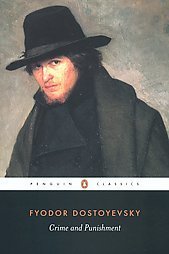
3.5 stars
First Sentence: Under a certain roof, in a certain one-roomed apartment, on a certain fourth floor, lived two young civil-servant colleagues, Arkady Ivanovich Nefedevich and Vasya Shumkov…
Thoughts: This was an okay collection of four short stories. They were entertaining, but nothing really grabbed me. Then again, nothing really annoyed me so there’s that. Rated in ascending order of how much I liked them they are:
White Nights: The story of an unnamed narrator and his brief friendship with a woman named Nastenka. The narrator liked to walk alone at night along the streets of St. Petersburg and imagine the houses were talking to him. One night he came across a young woman being annoyed by an oafish man. He rescued the woman and walked her home, conversing all the way. She invited the narrator to come over the next night so they could continue their conversation. Over the next four nights Nastenka told him her life story. It was mainly the tale of her love for the young man who boarded at her aunt’s house the year before. He went home to earn enough money to get married on, promising to contact her when he returned to St. Petersburg. Nastenka found out the young man was back in town, but hadn’t gotten in touch with her. The narrator spends his time in the story falling in love with Nastenka, but all for naught since the other young man does meet up with her and they get married.
A Weak Heart: Arkady Ivanovitch Nefedevich and Vasya Shumkov are roommates, as the first sentence implies. Vasya comes home late one New Year’s Eve absolutely incandescent with delight. He got engaged to a Nice Young Girl that day. Unfortunately he also has a pile of papers for work that are due on January 2 that he hasn’t even started on yet. He tries to sit down to work, but he can’t. Arkady tells Vasya that he’ll pay all his New Year’s visits for him so Vasya can catch up on work. Instead Vasya goes insane, leaving Arkady to pick up the pieces.
Uncle’s Dream: The story of how Mariya Aleksandrovna Moskaleva lost her standing in the town of Morsadovo thanks to Prince K. The Prince was an elderly man with a touch of the dementia. Everyone loved him, though, and called him “Uncle” even if they weren’t related. One day Pavel Mozglyakov found Prince K next to his overturned sleigh in the woods. Uncle was escaping from the harpy of a housekeeper at his estate. He had no idea where he was going, so Pavel took him to Moskaleva’s house. Pavel knew Moskaleva well because he was in love with her daughter Zinaida, even though she kept refusing his proposals. Moskaleva got a brilliant idea to marry Zinaida to Prince K because he was old and wouldn’t live much longer. Then Zinaida would inherit all his money and they’d be living on Easy Street. Pavel finds out about the plans, however, and tells Uncle who then turns the whole thing into a scandal.
The Meek One: A dark, disturbing tale of a woman driven to suicide. The narrator is a pawnshop owner with a checkered past. He met his wife when she brought trinkets to pawn to get enough money to run newspaper ads offering her services as a governess. The narrator discovered the girl (she was only sixteen) was running the ads so she could get a job away from her aunts who wanted to marry her to a brutal grocer. The narrator offers his hand in marriage instead. She accepts, but comes to regret that decision. There is absolutely no communication between them once they are husband and wife. She tries to get away from him through an affair, but that doesn’t work. She points a revolver at his head one night, but can’t bring herself to pull the trigger. Eventually she falls ill and the narrator has to nurse her back to health. When she recovers, he promises to take her to the Mediterranean to recuperate. He goes to get their passports, but when he comes home he finds a crowd gathered over his wife’s broken body in the street. She had jumped out the window to get away from him, although the narrator refuses to acknowledge his role in her death.
Why was that one my favorite? Why am I like this?







